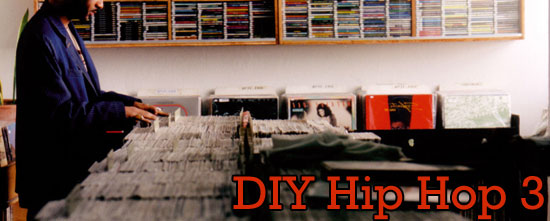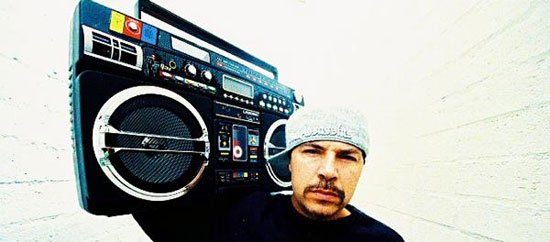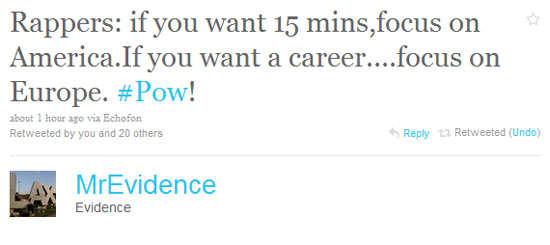DIY Hip Hop Business Master Class 3: Life Lessons
Posted by Justin Boland on May 21, 2010 | 0 Comments

For the first two installments of the DIY Hip Hop Master Class, I’ve used a collage technique, splicing together a paragraph or two from about a dozen different interviews. I’ve been trying to include as many perspectives as possible. For the third edition, though, I’m trying something different. There’s only three voices this time-and each of them is a genuine veteran with a lifetime of lessons to teach. This is shorter than previous episodes, too, because you should definitely click through and read the entire interviews.
Print this out, pass it along, take notes and apply it to your own business ASAP…
Phonte on Staying Independent and In Control

Source: Onion A/V Club
What were your experience like with ABB, compared to Atlantic? It seems like you were pretty frustrated with both.
The thing about all labels is, they all got their shit to deal with. In the case of Atlantic-a major label is going to fuck you, but they got money, so the fucking don’t feel as bad, because whenever you complain or have problems, they’ll just throw some money at you and make you complacent for a while. You’re kind of just, “Okay, well, whatever; I’m gonna get me some, get my money.” But with an indie, they try to pull the major-label shit, but they don’t got major-label money. With ABB, they were just really incompetent in a lot of ways. They were not really up front with us about what they could do, what their limitations were, what the venue limitations were as a label. For whatever reason, they just didn’t feel comfortable telling us those things. I’m not saying I need to know your financial history for the past 15 years and shit like that, but if you know you can’t get records in the store, just tell us you can’t get them in the store. It was just very frustrating, man, very frustrating. It could have been a lot better than it was if it weren’t for the greed and need to try to control everything and do everything for the sake of saving a buck. They really missed out on a lot of things in the long run. It was just very, very frustrating.
You said in an interview, “The knowledge that I’ve gained from the fallout with Atlantic is way more valuable to me than any kind of money I could have made.” What was the most important thing you learned, being on a major label?
Just that no one is going to work harder for me than myself, and that there was nothing more valuable to me than my music. You always think that, at least for me, coming up, doing it on every level, doing it from indie-indie to a major-indie, putting out records on Koch and going to Atlantic, you always think that the major label has been the brass ring in a lot of ways. It’s like, “I know that when I get to this major, they’re going to be doing this, and they’re going to give us all these perks. They got the power.” Going through that, I found that nothing worked harder for us, nothing opened more doors for us, than our music. It wasn’t really the label doing anything for us. I remember when we signed to Atlantic, and the press people, the PR people, were calling us like, “The phone is ringing off the hook for you guys. Normally we have to pitch artists to magazines and stuff, but these people are calling us for y’all. We’ve never had that happen before with a new act.”Â
I just saw that there is no magic wizard that’s going to come and make everything better. You really just have to do the shit yourself. And if you’re going to do it by yourself anyway, you might as well do shit all the way by yourself, so you can see all your money, you know what I’m saying? [Laughs.] So that was when 2007 came and we finished Getback; in 2008, me and Zo! put out the Zo! And Tigallo Love The 80’s record, and me and Nicolay put out Leave It All Behind, both by ourselves. I just never looked back from that point.
I remember thinking when you signed to Atlantic, “Wow, this is great. Their music will reach a much larger audience,” but it sounds like that wasn’t the case.
Naw, it’s not, it’s really not, man. I really have to credit my man Rakaa from Dilated Peoples for putting me up on game early on. They were one of the cats that we really watched their grind, and they never forgot where they came from. They were really supportive of us early on. Me and Rakaa would chop it up. Real good brother, real good dude. He told me straight up, “Man, you know the thing that the labels do to suck you in is they tell you, “We give you full creative control.’” He was like, “Creative control is cool, they’ll give you creative control, but they’ve got financial control. They’ll tell you you’ve got full creative control, you can do whatever you want, you can make the records you want to make. But they’re going to tighten up the purse strings on you, so really, “creative control’ is pretty much an empty slogan.” It really don’t mean shit. “We’ll give you creative control, but, you know, nigga, we ain’t putting no money behind your shit.” So with us, that’s kind of what happened. They allowed us to make the record that we wanted to make, and that was very fortunate in and of itself, but, I don’t know, man, it just didn’t pan out. It didn’t pan out the way I thought it was, but I guess it all worked out for the best. I don’t have any regrets about the situation at all.
DJ Muggs on Building a Foundation That Lasts

Source: Hip Hop Game
Why do you think the free download is a bad business move?
I don’t think it’s smart. Here’s what I think ““ I think there’s no visionaries. Nobody can see what’s next. Everyone’s following suit and they’re four years behind. If you’re an artist and you want to build something, you don’t throw a bunch of mixtapes out. There’s no value in the mixtapes. It devalues music. It’s a waste of fucking time. Someone can hear it and it can be the best shit of all time and it’s not going to matter. Let’s be honest.
But let’s put an album out instead of a mixtape. You know what you can do with that album? You can get interviewed on HipHopGame. You’re going to get press. Promoters are going to take it serious. You’re going to be able to go on tour. The shit’s gonna be on sales at the stores and you’re going to have a retail history for your next album. Did you ever hear Rakim put out a mixtape?
Let’s take it to now. You don’t see an Atmosphere or Brother Ali put out a mixtape. What you do is you put an album out. If you’re a new group, put an album out and go tour like a punk rock band, for nothing if you gotta do “em. Then you put your second album out. Not a mixtape, an album. Now you’re cultivating a fanbase. After three years, you’re going to have a nice fanbase and you’re going to be able to tour and sell merch and albums. You’re going to build an identity and tour and build a career. You’re developing yourself as an act. This is my personal opinion. They’re not building nothing. If you’re giving music away there’s nothing to attach it to and it’s going to waste. People are going to pay more attention to your album. They get shelf space and they get ad space.
Why do you think so many up-and-coming artists give away mixtapes for free?
I think a lot of people have the right idea but they don’t know what they’re doing. They’re all over the place and they have no direction. Their ideas are regurgitated ideas that are five years old. You have to know what’s next. The mixtape game was hot. It got people a little bit out there but I think a lot of these guys are going to become mixtape rappers. Where are their albums? They have 15 volumes of mixtapes but where are their albums? The element of surprise, homie.
You didn’t hear Public Enemy mixtapes before the first album so when you heard the album it had a huge impact. Same with The Chronic. After I hear five mixtapes from you and you come with an album, I heard it all. What do you do now? I heard it all. Maybe get a big-name producer? These kids need to start focusing on putting their album out and even if you ship 1,000 records, homie, it’s on the shelf and you can tour and then you do it again and do it again until you’re selling all those records.
Do what the punk rock bands do and sell them at the venues. That’s how I feel about the mixtapes. It might work for somebody and that’s good but if I had a new artist coming out, I would leak songs but would I come out with a fucking mixtape? No. You better go and work, homie, for the next three years. You gotta work. Nothing’s for free.
Blogs are much more effective today than they were four years ago. What do you think of the blogs’ impact on music?
I think they’re good and bad. I think that the news is old. As soon as it’s up on a blog, it’s over. Feel me? “Oh, that’s old already. That was up yesterday. It’s old.” Everything is so quick and there’s no shelf life. It’s part of the game that you gotta work with Twitter and use it to get you out there, but I think even with a lot of the rappers using all this stuff, the thing that these rock stars had was you couldn’t touch them, dude. You didn’t really know them. There was a bit of mystery that made it bigger than life and made you want to be it. Now everything is personalized and that part of the game is gone.
It’s like, “I know you. You’re not special to me.’ Metallica wasn’t doing that shit. I don’t look at Jay-Z and wonder what I should do with my career. I never did. I wanted to be the Rolling Stones. I wanted to be Led Zeppelin. I wanted to be Black Sabbath. I wanted to be the bands making the most money touring all over the world. That’s who I wanted to be like and that’s who I always wanted to be like.
ADVICE FROM YOUR BIG BROTHER EVIDENCE

Source: Hip Hop DX
HHDX: A lot of people are signed to majors, what’s better major or independent?
Evidence: Music is way better on the independent level because you can just do what you want to do. It’s always that group that makes that great independent record and then they get signed up and make that bullshit album on a major, because they felt the pressure. Music is always most raw in independent form, major is good for exposure as far as being able to walk down the street. People recognize you, show money is up because of the amount that’s invested in you. Independent is dope, because it’s like if you work hard you gonna make money and sell records. Majors give you a bunch of money up front, putting that shit in your pocket and whether you do good or done great you made money [laughs]. Dilated, we have four of those, four albums worth of those so it’s beautiful for my bank. I’ll tell you though that a lot of stress went into to that as well. Right now I’m just happy to be on the independent side, if I stay on my grind and people show love showing up I’ll end up earning my money, it’s dope being independent.
HHDX: So for an upcoming MC you would tell them independent is the way to go right?
Evidence: Definitely, especially to start out. The major shit is rough, they’ll let you do you for a minute, but when they start molding the shape it’s never the same. It’s like that crack fiend tryna chase that high he got for the first time - it’s not gonna happen again. It’s good to be loved on the label as an artist, but it’s only for a limited period of time. It’s never a short thing, don’t make too close friends with people at the label. Their jobs are at stake and your ass is on the line all the time. That shit is real, it comes and goes, it’s like a revolving door. Get it if it’s now, if you have the attitude like “I don’t even know if I’m gonna be living a year from now”, why not? If that’s the attitude you living by, I’ll back that up for you a 100%. Some people think long term, some people think short term, but ain’t nothing wrong just make it yours either which way you do it. Don’t deviate from the past you envisioned, because you got these so-called experts implementing their ideas. Just always remember what your vision was.
HHDX: Is that the reason why a lot of major artists go through the sophomore slump?
Evidence: Definitely. The first album - it took you your whole life to make that shit. Sitting on songs for six years, performing around the world crowd-tested approved, it’s that shit. When the second comes around you start from scratch literally and you gotta make it in six months. That’s why that jinx shit keeps happening to a lot of people.

